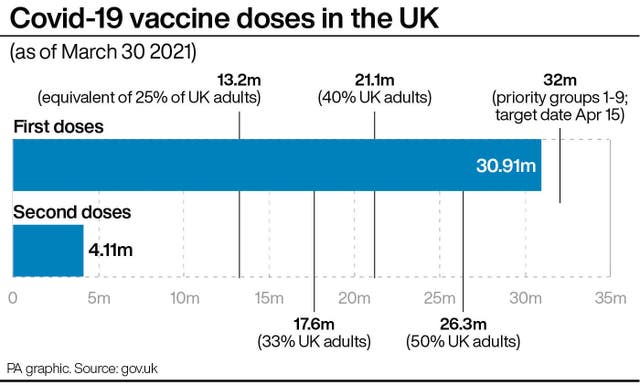‘Off the scale’ antibodies from Pfizer jab could protect against Brazil variant
Researchers also said the vaccine protects people against the Wuhan and Kent strains of coronavirus.

The Pfizer vaccine produces an “off the scale” immune response that is likely to protect against the Brazilian variant of Covid-19, researchers say.
The biggest study on antibody and cellular immune factors to date suggests people are likely to be protected against the Wuhan, Kent and Brazilian types of coronavirus following two doses of the vaccine.
The research, led by the University of Birmingham and including Public Health England’s Porton Down laboratory, found 98% of people aged 80 or over who had two doses of the Pfizer jab had a strong antibody immune response.
It comes as other new data from Pfizer suggests the vaccine is 100% effective in preventing Covid-19 cases in South Africa, where the variant which emerged in that country is common.

Among 800 people in the South African arm of a phase three clinical trial, nine cases of Covid-19 were observed – all in the group not given the vaccine.
Six of the nine Covid cases were the South African strain, with Pfizer saying this demonstrates the jab can induce “a robust neutralising antibody response to the (South African) variant”.
For the Birmingham study, 100 people aged 80 to 96 received their vaccine doses three weeks apart, before the UK adopted a policy of stretching the time between jabs to 12 weeks.
Published in The Lancet, the research found people who had previously had natural Covid-19 infection had a peak antibody response after just one Pfizer vaccination.
The antibody response in these people remained 28-fold higher even after the second vaccine dose.
Blood samples from all participants showed the original Wuhan strain was strongly neutralised after two doses of the jab.
While neutralisation reduced 14-fold when tested against the Brazilian variant, experts believe the very high immune response generated by the vaccine is enough to provide protection against that strain.
The study found cellular T cell responses developed in 63% of the older people given two doses of the Pfizer jab.
Like the cells which produce antibodies, T cells are crucial to the immune system’s response to viral infection.
Professor Paul Moss, from the University of Birmingham and leader of the UK Coronavirus Immunology Consortium, told a briefing: “In terms of the variants and how we control them, people seem to be taking two broad approaches.
“One is we can develop another vaccine, a booster against these specific variants, so we perhaps have a South African booster vaccine – that’s one approach and people are working on that.
“The other potential is that you boost your antibody levels so high from whatever vaccine you have that there’s enough to go around and you cope with the variant.
“We’ve certainly seen in this paper that the antibody levels are so good, really after the first two weeks, that we are pretty confident that this should be very helpful against the Brazilian variant.”
Asked if he is surprised how well the vaccines have worked in older people, he said: “We were. When we sent these samples to Porton Down they said ‘we can’t give you results right now because we’ve got to dilute them because they’re so high, they’re off the scale’.
“The antibody levels were so high that they’d gone above the thresholds so they had to dilute them.”
But he added it will be crucial to see how long antibody levels are maintained after people have had a Covid-19 vaccine.
“It will be important to assess that and whether they wane at different rates in people of different ages,” he said.
“I think that’s something that we have to watch out for.”
Although the new study did not look at the Oxford University/AstraZeneca vaccine, Prof Moss said the evidence for the jab is that “it’s very, very effective”.
He added: “The UK has a strong portfolio of vaccines – Pfizer, AstraZeneca, we’ve got Moderna coming very soon, and Novavax as well.

“So yes, I think it’s possible that we can have very broad vaccine coverage across the UK very quickly.”
On T cell responses, Prof Moss said they are “better against variants overall” than antibodies, but he added the role of T cells in fighting coronavirus is still uncertain.
“I do think cellular immunity is very important,” he said, adding that a third of people in the study had no cellular responses detected.
“We know that, as people age, their cellular and immune responses are more difficult to elicit.
“Even influenza vaccines are much less effective in older people so that’s something that we will keep an eye on very closely.”
Prof Moss also said the UK’s plan to exit lockdown appears to be “on track”, with policies to control variants, the development of new vaccines and a strong immunisation programme.
“I think we can be confident about gaining control of variants with the current plans, and also leaving lockdown,” he said.
First author on the paper, Dr Helen Parry, a National Institute for Health Research academic clinical lecturer at the University of Birmingham, said: “Our research provides further evidence that the mRNA vaccine platform delivers a strong immune antibody response in people up to 96 years of age and retains broad efficacy against the P.1 (Brazilian) variant, which is a variant of concern.”





